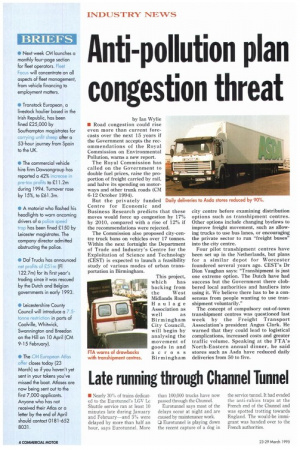Anti-pollution plan congestion threat
Page 6

If you've noticed an error in this article please click here to report it so we can fix it.
by Ian Wylie • Road congestion could rise even more than current forecasts over the next 15 years if the Government accepts the recommendations of the Royal Commission on Environmental Pollution, warns a new report.
The Royal Commission has called on the Government to double fuel prices, raise the proportion of freight carried by rail, and halve its spending on motorways and other trunk roads (CM 6-12 October 1994).
But the privately funded Centre for Economic and Business Research predicts that these moves would force up congestion by 17% by 2010, compared with a rise of 12% if the recommendations were rejected.
The Commission also proposed city-centre truck bans on vehicles over 17 tonnes. Within the next fortnight the Department of Trade and Industry's Centre for the Exploitation of Science and Technology (CFST) is expected to launch a feasibility study of various modes of urban transportation in Birmingham.
This project, which has backing from the West Midlands Road Haulage Association as well as Birmingham City Council, will begin by analysing the movement of goods in and across Birmingham city centre before examining distribution options such as transhipment centres. Other options include changing byelaws to improve freight movement, such as allowing trucks to use bus lanes, or encouraging the private sector to run "freight buses" into the city centre.
Four pilot transhipment centres have been set up in the Netherlands, but plans for a similar depot for Worcester foundered several years ago. CEST's Dr Dion Vaughan says: "Transhipment is just one extreme option. The Dutch have had success but the Government there clobbered local authorities and hauliers into using it. We believe there has to be a consensus from people wanting to use transhipment voluntarily."
The concept of compulsory out-of-town transhipment centres was questioned last week by the Freight Transport Association's president Angus Clark. He warned that they could lead to logistical complications, increased costs and greater traffic volume. Speaking at the ETA's North-Eastern annual dinner, he said stores such as Asda have reduced daily deliveries from 50 to five.




































































































